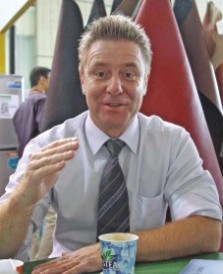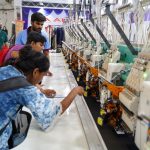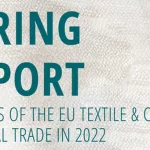A top BASF official talks about the equation between chemicals and textile industry in Dhaka
Textile factories should use eco-friendly chemicals to maintain good health of soil and environment. If textiles are not produced maintaining a ecological balance, the environment will be in trouble in future, said Klaus Tiedemann, global manager of German-based chemical company BASF, in an interview in Dhaka recently.
“You should use ecologically sound chemicals in production of textiles, so that the environment is protected,” he said at the BASF stall in German Trade Fair. Using of modern machine, best technologies and good quality chemicals can ensure an eco-friendly textile production, he said. He said to sustain in the race of the business globally the textile producers have to comply with two important requirements: the legal requirements and the requirements set by the retail chains or international buyers. There are many toxic chemicals that are dangerous for both ecology and environment. But the producers have to use those chemicals following the rules or in some cases replace those also after treatment. Setting up an effluent treatment plant (ETP) is very important for the textile companies to maintain a good health of the soil and environment, he added.
It is true that setting up an ETP by a lone company is expensive, but it will be easy if some producers make it jointly in a particular industrial belt, he said. Treatment of textile products requires a lot of water and chemicals. But, if the water can be reused, the producers will be beneficial from the ETP. Many countries reuse treated water that helps save the natural resources of underground water. With the ETP, the textile producers will be able to use any kind of chemical, because that will be treated thus and will not be harmful for soil, ecology and environment. No harmful substances should be used by the producers, as the buyers always query about social standards, labour standards and child labour. “The textile industry owners should be aware about the customers’ requirements not only for the international market, but also for the local market, as many producers care less about the local consumers.”
The relaxation of the rules of origin (RoO) for the least developed countries (LDCs) by the European Union since January of this year has hurt the chemical business in Bangladesh to a bit, he said. After the relaxation, the garment makers get the duty-waiver facility under the generalised system of preferences even if the garment is made from imported fabrics. As a result, textile production declined in Bangladesh as import increased, he said.
In 2010, BASF sold chemicals worth 67.05 million euros in Bangladesh when the company’s global sale stood at 63.9 billion euros. The company may set up a chemical processing plant in Bangladesh as it has the potential to maintain a stable economic growth, Tiedemann said.






